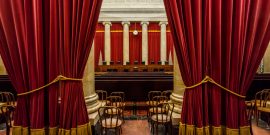A Bad Season for Campaign Finance Reformers
The presidential primaries have been a bad time for campaign finance reformers. Their basic claim is that money has a uniquely powerful and disproportionate influence in politics. But this campaign season shows that there are many other sources of influence—celebrity, academia, and the media—that can be even more potent.
The Republican party’s initial front runner, Jeb Bush, collected more money early on than other Republican. Allies also established a SuperPAC—Right to Rise—that had more money than any other associated with a competing candidate. Yet Bush exited without winning a single primary. And his candidacy also showed that money in his allied SuperPAC was no substitute for contributions directly to the candidate, as the Bush campaign had to cut back on operations after initial setbacks.
Trump, in contrast, spent little money and showed the power of celebrity, particularly in combination with media access. Studies have shown that he got more free media than any other candidate—$1.9 billion worth, by one estimate. And the media did not put him front and center for public-spirited reasons. Trump, a celebrity rather than a typical politician, made for high ratings. This performance should remind us that media corporations, like others, are run for profit, and that campaign finance reformers are unjustified in discriminating in their favor against the speech rights of non-media, for-profit corporations.
The rise of Bernie Sanders shows the influence of another power center for politics—academia. Ever since the 60s the left has been marching through our campuses and has now attained overwhelming dominance over the education of the young, particularly in the humanities, but also in most of the social sciences. It is hardly surprising that a hard Left candidate would become the darling of the youth. Sanders’ success is due in no small measure to the monolithic ideology of the teaching profession.
Thus, the 2016 campaign has underscored that there are many axes of inequality of political influence: celebrity, the media, and academia. Money is not likely the most powerful, because media and academia can better set a long-term agenda, and celebrity has a particular hold on our culture. It certainly is not the most ideologically unbalanced source of influence.
Larry Lessig of Harvard Law School has suggested that this season shows the need for campaign-finance reform, because both Trump and Sanders have gained success by arguing that their opponents have been bought by the special interests that contribute to their campaigns. But populists regularly rail against the powerful, from political bosses to the press, even when they have their own sources of special influence as do Sanders and Trump. Their attacks hardly suggest that we should deprive the wealthy of their constitutional rights any more than we should the media or party magnates. It just shows that one answer to speech funded by some, is opposing speech. And that is exactly the remedy the First Amendment prescribes.

